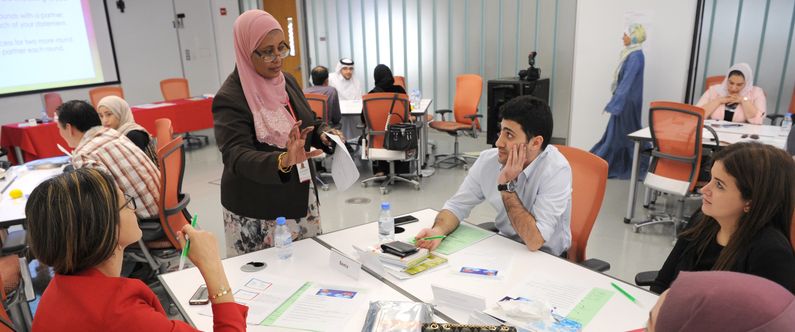WCM-Q course boosts emotional intelligence for health professionals
 Huda Abdelrahim speaks with participants during the Mastering Emotional Intelligence course.
Huda Abdelrahim speaks with participants during the Mastering Emotional Intelligence course.
Health professionals in Qatar developed enhanced emotional intelligence skills on a new course offered by Weill Cornell Medicine-Qatar’s Institute of Population Health.
The two-day course, entitled Mastering Emotional Intelligence, explained how healthcare professionals can develop emotional awareness, manage the sources of their behavior, understand and manage emotional triggers, and reflect upon their social awareness skills. The ultimate aim of the course is to train healthcare professionals to utilize their emotional intelligence skills, in order to improve the emotional well-being and healthcare outcomes of their patients, as well as maintaining self-care.

The course, delivered at WCM-Q, featured presentations and workshops on basic concepts in emotional intelligence (EI), methods for EI self-appraisal, understanding and improving self-awareness, developing self-management skills, social awareness, and relationship management. In the final session, attendees were helped to write their own EI action plan and goals, before an interactive discussion session in which the participants reflected upon what they had learned.
The course was delivered by Ms Maha Elnashar and Ms Huda Abdelrahim of the Center for Cultural Competence in Healthcare (CCCHC), Institute for Population Health, who are certified by TalentSmart Inc. one of the world’s top providers of emotional intelligence training.
Ms. Elnashar, director of CCCHC, said: “Well-developed emotional intelligence skills are extremely valuable and important in the healthcare sector, particularly in culturally diverse environments like Qatar. Through emotional intelligence, we can all transcend cultural differences, which in healthcare can lead to improved emotional well-being for patients, more effective communication and improved healthcare outcomes. We are extremely pleased that our participants showed so much openness to the concepts of emotional intelligence and worked hard to discover how enhanced EI skills could help them in their work.”
Research has shown that EI education in the medical sector benefits intrapersonal and interpersonal communication skills and leads to improved patient-doctor relationships, enhanced performance, and increased job satisfaction, leading to higher levels of care. Good communication and feelings of mutual respect between doctors and patients can help patients explain health issues more fully and accurately, and to follow their doctor’s recommendations. Being emotionally intelligent means those individuals can recognize, understand and manage their own feelings and the feelings of others in positive ways, giving them an enhanced capacity to deal with highly stressful situations, improving their communication skills, and increasing empathy.
Ms. Abdelrahim commented: “Healthcare professionals are working in a very stressful work environment, which could affect practitioners’ health, actions, attitude and consequently their performance. High level EI professionals have the ability to balance personal and professional needs, and to handle stressful situations, which is an essential attribute in healthcare settings.”
Dr. Ravinder Mamtani, senior associate dean for population health, capacity building and student affairs, said: “Healthcare professionals who have good emotional intelligence skills maximize their potential to ensure positive outcomes for the emotional and physical wellbeing of their patients. By showing empathy, communicating effectively and respecting cultural differences, doctors can form effective therapeutic relationships with patients that provide a huge boost to the caregiving process, ultimately leading to improved healthcare outcomes. That is why we are such strong advocates of emotional intelligence training.”